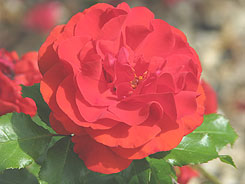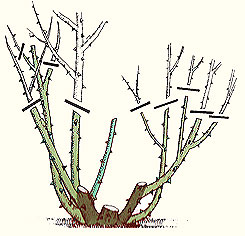Pruning Roses - A Guide to When and How to Prune a Rose Bush
WHY DO YOU NEED TO PRUNE ROSES?
Reasons to prune roses:
1:To give the rose bush shape.
2: Pruning roses increases the healthiness of the rose by letting in more light and air
3: To reduce the number of growths so that the plant produces fewer blooms but of better quality.
4: To remove any dead or dying wood.
PLANT SOCIETIES
PRUNING ROSES - BEFORE YOU START
 A
pair of secateurs incorrectly used can do more harm than good to a rose
bush.
A
pair of secateurs incorrectly used can do more harm than good to a rose
bush.
So before chopping off wood from your rose bush which can’t be put back, it is worth giving some thought to just what you are trying to do.
HARD OR LIGHT PRUNING? HOW MUCH TO CUT BACK
Another thing you must usually decide yourself is whether the plants should be pruned lightly or hard.
With light pruning, the result will be a large bush with small flowers.
Hard pruning of roses will give a display of fewer but larger and better-formed blooms.
 Of
the bush roses,the growths on the hybrid teas should be cut back to 3—4
buds, those on the floribundas to 8—9 buds.
Of
the bush roses,the growths on the hybrid teas should be cut back to 3—4
buds, those on the floribundas to 8—9 buds.
If this is done in late March or April, the new growth will not be likely to suffer damage from severe frosts.
All dead and dying wood is also removed.
Always prune to an outward-facing bud, or, if this is not possible, to a side-facing bud. This encourages a goblet shaped rosebush.
Never prune to an inward- facing bud, as this will tend to ‘fill in’ the centre of the bush.
Established roses should be pruned according to their needs, and as circumstances dictate. Whether the variety is weak-growing, or of normal or exceptional vigour, should all be taken into account.
PRUNING ESTABLISHED ROSE BUSHES
Established roses should be pruned according to their needs, and as circumstances dictate. Whether the variety is weak-growing, or of normal or exceptional vigour, should all be taken into account.
WHEN TO PRUNE ROSE BUSHES
An often asked question is "When should I prune my rose bushes?"
Most people prune hybrid tea and floribunda roses in spring during the months of March or April.
Others favour winter pruning of roses; this gives earlier growth, but there is a risk of damage by late frosts.
PRUNING CLIMBING ROSES
Climbing roses should be cut to within a foot of the soil after planting, ramblers to within 3—4 iinches. Any dead wood is also removed.
Climbing hybrid tea roses shouldbe pruned very lightly or not be pruned at all, as they are liable to revert to bush form if cut back hard.
PRUNING HYBRID TEA ROSES
Hybrid tea rose bushes will respond to hard cutting—say, back to 8—9 buds if the variety is vigorous, 3—4 if it is not. With floribundas, a good rule is to cut the strong wood back to within 12—15 inches of the base, and weaker wood to within 8—12 inches
Hybrid tea roses should be further pruned in the summer, after the flowers have faded.
At this time take them back to within 5—6 buds of the start of the current season’s growth. This will help to form strong flowering shoots of good quality.
HOW TO PRUNE RAMBLER ROSES
Rambler roses of the Wichuraiana type should be pruned as soon as flowering ceases.
Shoots made in the previous season (which will have flowered) are cut down to ground level.
The shoots which have grown during the current season—which will bear, next season’s flowers—are then tied in.
Rambling roses which do not produce new growths from the base at all freely must not, of course, be cut back in this way. Just some of the growths should be cut back to a dormant bud about 8 inches above soil level. This will encourage new growths to form from the base, and still leave enough old growths to cover the structure they are growing against.
REMOVE SUCKERS FROM ROSES
Just as weak and unwanted shoots should be removed as low down on the stem as possible, so too should the suckers, which can be a nuisance with many roses.
Cut or pull these rose suckers out at their source, which will be either below soil level or low down on the stem.
Suckers occur on budded roses, and are an attempt by a strong growing stock to gain ascendancy over the growths of the variety.
GARDENING ARTICLES AND RESOURCES ON GARDEN GROWER
When and How to Prune Roses, When should I prune my rose bushes?" Pruning climbing Roses, how much to cut back a rose bush. How to prune Rose bushes - an expert guide on pruning roses to produce better flowers.